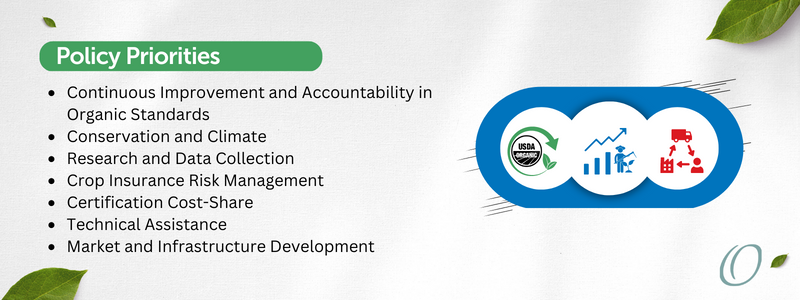
The Farm Bill is an omnibus package of legislation that is renewed every five years. It sets the agenda for agriculture policy and spending for years to come and is critical to the success of the organic marketplace.
The Organic Trade Association’s (OTA) Farm Bill policy priorities are centered around ensuring organic standards keep pace with marketplace demands and provide supportive research and risk management tools to organic farmers. We’re calling for conservation and climate-smart programs to acknowledge the contributions of organic farming practices in protecting natural resources, and policies that strengthen the resiliency of the organic supply chain.
In 2018, the Farm Bill – the comprehensive food and agriculture legislation that Congress updates every five years – directed only 0.1% (about $0.5 billion) of its $428 billion budget to organic-specific programs over five years.1
Learn more about OTA's 2023 Farm Bill Priorities below.
___________________
1 Source
Blue
Continuous Improvement
The Continuous Improvement and Accountability in Organic (CIAO) Standards Act was introduced to add transparency and accountability to the federal regulatory process for organic and to require USDA to act in a timely and transparent manner when the industry comes together to make recommendations to advance the organic standards. In order to keep organic standards relevant and current, CIAO creates a regulatory process for the National Organic Program to make revisions across 5-year cycles based on public input, tangible evidence and science, and recommendations from the National Organic Standards Board. CIAO makes these changes in the regulatory process without requiring additional appropriated funds. This Congress, the new version of CIAO has garnered a more diverse coalition of supporters across the entirety of the organic industry. OTA hopes by working to build this base of support, Congress includes the reforms of CIAO in the base of the Farm Bill under consideration.
How to take action + Key Resources
- Sign: CIAO Coalition Sign-on Letter
- Contact: The Organic Trade Association spearheaded the largest organic coalition in recent history to support this bill. Now, your voices need to be heard. Contact your representative and urge them to back CIAO. If you or your business is a constituent of a House Agriculture Committee member, contact Matthew Dillon to ask how you can help introduce the bill.
- Download: We’ve put together a comprehensive toolkit to help you take these actions and more. Download it by completing the form below.
- Continuous Improvement and Accountability in Organic Standards Act (CIAO) 2023: H.R. 5973
- Download: CIAO info one-pager
- Press Release: Bipartisan bill introduced to ensure continued advancement of organic
- Farm Bill: Fight for critical advancement of organic
Take Action - Download the CIAO Take Action Toolkit by filling out the form below:
Blue
Market Development
The Organic Market Development (OMD) Act was introduced on Sept. 27 in the Senate by Sen. Tammy Baldwin (D-WI), Sen. Angus King (I-ME), Sen. Peter Welch (D-VT) and Sen. Kirsten Gillibrand (D-NY) and its companion bill in the House by Rep. Anne Kuster (D-NH), Rep. Chellie Pingree (D-ME), and Rep. Andrea Salinas (D-CA). OTA applauds the introduction as the legislation will go far in helping to unlock the potential of the organic marketplace and ensure the continued growth of organic in the United States.
The OMD Act is aimed at leveraging investments in new and expanded organic markets by funding and supporting increased processing capacity, market development activities, targeted equipment purchases, and other activities to increase consumption of domestic organic commodities. This legislation, codifying an existing U.S. Department of Agriculture (USDA) program, is fundamentally about solving the supply chain gaps for the market to support organic farmers and businesses. It creates a development program, administered by USDA’s Agricultural Marketing Service, to offer grants annually to eligible applicants. OMD will codify the Pinpointed Organic Market Development element of the Organic Transition Initiative, filling supply chain gaps in the organic marketplace and shoring up domestic organic production through investment in infrastructure. Grants under OMD will be structured in three project types, 24-month Simplified Equipment-Only with funding between $10,000 and $100,000, and 3-year Market Development and Processing Capacity Expansion with funding ranging between $100,000 and $3,000,000. OMD would maintain the 2023 funding base of $75 million annually through Commodity Credit Corporation funding. Additionally, OMD will allow authorization for appropriations of $15 million for 2024 and each fiscal year thereafter.
“The Organic Market Development Act strongly compliments existing and proposed legislation with federal investments in organic research, farm-level transition opportunities, and process improvement for an effective oversight and regulatory function to ensure and maintain the organic standards and consumer confidence,” said OTA CEO Tom Chapman. Read our full press release here.
You can support OMD by signing on to OTA's industry endorsement letter and contacting your representative and urging them to co-sponsor the bill. If you or your business is a constituent of a House Agriculture Committee member, contact Matthew Dillon to ask how you can help introduce the bill.
OTA Members: Download the Organic Market Development Act Take Action Toolkit and take action today!
Download Toolkit
Blue
Organic Dairy Data Collection Act
The organic dairy industry has a unique supply chain and challenges. From foreign wars to transportation issues and adverse weather, ranging from drought and flooding, world events are impacting feedstuff costs. These rising costs have created a dire economic situation for organic dairy farmers across the U.S. in recent years – leading to closures of farms and difficult economic circumstances.
Congress, the Department of Agriculture, farmers and other stakeholders need the necessary data to understand the challenges organic dairies face to support policies that better protect this vital sector. If not addressed with effective and appropriate policies based on accurate data, these
closures will have lasting, devastating impacts on the organic dairy sector and diminish the ability of domestic organic dairy to meet the demands of consumers in the marketplace for years to come.
The bipartisan Organic Dairy Collection Act (H.R. 6937):
- Directs USDA to collect and publish cost-of-production data for organic milk, including the costs of major organic feedstuffs, domestically produced or imported;
- Directs USDA National Agricultural Statistics Service (NASS) to gather and report monthly data on the price of organic milk;
- Directs USDA NASS, the Economic Research Service (ERS) or Agricultural Research Service (ARS) to publish reports on state and regional data on the cost and volume of organic milk production.
By having accurate and timely data available, Congress and USDA can make critical policy decisions which may affect the organic domestic dairy industry's ability to survive. Without this information, the agency can only estimate needs using data on conventional dairies, which proved to be insufficient during the roll out of the Organic Dairy Market Assistance Program and led to a significant underestimation of the costs incurred by organic producers.
The information collected by USDA under this legislation has applications beyond dairy, as other commodities could track feedstock costs as well. This is only the first step in data collection for organic - as organic continues to grow, having accurate data will become more crucial as Congress drafts policies and direct federal resources.
Blue
Science & Research
Strengthening Organic Agriculture Research Act
OTA supports the bipartisan Strengthening Organic Agriculture Research (SOAR) Act. On April 19, 2023, Representative Dan Newhouse (R-WA-04) together with Chellie Pingree (D-ME-01) and Jimmy Panetta (D-CA-13) introduced the legislation in the House. SOAR would reauthorize and increase the Organic Research and Extension Initiative (OREI) from $60 million in 2024 to $100 million 2028, with additional funds available through yearly appropriations. Additionally, SOAR was introduced in the House on April 19, 2023 by Representative Dan Newhouse (R-WA-04) with co-sponsors Chellie Pingree (D-ME-01) and Jimmy Panetta (D-CA-13). the bill would make competitive grants available to remove barriers, document effects, and develop improved methods for organic transition. Finally, SOAR would increase funding for organic data to $2 million per year through 2028 and require the Secretary of Agriculture to conduct an economic impact analysis of organic agriculture within 3 years to show the character of organic farms and their impact on local economies, the environment, social dynamics, and more.
The Organic Farming Research Foundation (OFRF)'s SOAR Act toolkit is available to provide background information about the Farm Bill and templates you can use to mobilize your organization’s members or yourself to contact legislators. These are meant to be starting points. For more significant impact, tailoring the materials using personal stories is an important next step in this work!
You can support SOAR by contacting your representative and urging them to co-sponsor the bill. You can make the greatest impact by advocating for SOAR to members of the House Agriculture Committee. Contact Matthew Dillon for advocacy support.
Organic Science and Research Investment (OSRI) Act
Additionally, OTA supports the Organic Science and Research Investment (OSRI) Act introduced by Senators Fetterman (D-PA), Booker (D-NJ), Brown (D-OH), Casey (D-PA), Gillibrand (D-NY), King (I-ME), Welch (D-VT), and Wyden (D-OR). OSRI would require better coordination between USDA research agencies and organic research and extension. OSRI would result in a feasibility study on transitioning more land to organic as well as authorizing a grant program to support producers to do so Finally, OSRI would provide for a stair-step increase of OREI funding to $100M by 2028.
The Organic Farming Research Foundation (OFRF)'s OSRI Act toolkit is available to provide background information about the Farm Bill and templates you can use to mobilize your organization’s members or yourself to contact legislators. Your involvement in making sure this Farm Bill supports farm-centered, action-oriented research programs like the Organic Research and Extension Initiative (OREI) and the important long-term research done at the Agricultural Research Service (ARS) is crucial.
![]() The $63 billion annual U.S. organic food and fiber sector is integral to today’s American agriculture and represents one of the country’s fastest-growing food production and processing categories. This sustained growth over the past 20 years is a result of a straightforward premise: the marketplace rewarding and confirming the value of producers and processors using organic methods and practices.
The $63 billion annual U.S. organic food and fiber sector is integral to today’s American agriculture and represents one of the country’s fastest-growing food production and processing categories. This sustained growth over the past 20 years is a result of a straightforward premise: the marketplace rewarding and confirming the value of producers and processors using organic methods and practices.
The benefits of organic go far beyond the farm gate, from the protection of soil, water, air, and livestock to human health and local rural economies buoyed by job creation and entrepreneurship.
Because organic food and products start with the farm, the Organic Trade Association’s (OTA) Farm Bill priorities are centered on extensive consultations and recommendations by our Farmers Advisory Council (FAC), one of the largest coalitions of organic farmers and farming organizations in the U.S. The FAC represents more than 9,500 growers and is inclusive of all regions and crop types, including meat and livestock products, grains, fruits, and vegetables. In addition to consulting with our FAC, the trade association hosted a series of workshops with nearly 300 certifiers, growers, consumer-facing brands, retailers, and non-profit organizations to determine policies that will support organic agriculture into the next decade and beyond.
These diverse participants agreed that to continue to grow the global organic marketplace and bring further economic benefits to U.S. producers and their locally connected supply chains, the next farm bill must include financial and policy investments to ensure:
- Organic standards are responsive to marketplace demands
- Research and risk management tools are fair and equitable in their support of organic producers
- Conservation and climate-smart programs recognize the historical contributions of organic producers in protecting natural resources
- Organic supply chains are resilient in the face of known and unknown risks such as disease, weather, and increasing costs.

Red
 USDA’s National Organic Program (NOP) develops and enforces the national standards for organically produced agricultural products sold in the United States. It also accredits third-party organizations to certify farms and businesses as meeting the U.S. organic standards, allowing the use of the USDA Organic seal. Unlike other private food labeling and marketing claims, the USDA organic program continues to be the only agricultural production and processing system that is clearly defined and enforced by federal law.
USDA’s National Organic Program (NOP) develops and enforces the national standards for organically produced agricultural products sold in the United States. It also accredits third-party organizations to certify farms and businesses as meeting the U.S. organic standards, allowing the use of the USDA Organic seal. Unlike other private food labeling and marketing claims, the USDA organic program continues to be the only agricultural production and processing system that is clearly defined and enforced by federal law.
Building off the progress made in the 2018 Farm Bill, Congress must continue to protect the integrity of the USDA Organic label, the producers and processors that lawfully abide by the standards, and the consumers that pay a premium for USDA organic by bolstering USDA’s resources and authority to enforce the U.S. organic standards worldwide and combat fraud.
While standards compliance and enforcement are essential to consumer trust, consumers also expect the U.S. organic standards to evolve and remain fresh. Congress must ensure the organic standards continuously improve over time and hold USDA accountable for moving at the speed of the marketplace.
- The 2023 Farm Bill should:
- Authorize annual funding for NOP to keep pace with organic industry growth with a 10% increase each year to the existing $24 million-per-year authorization over the life of the Farm Bill.
- Continue mandatory funding of $5 million for NOP to upgrade and maintain technology systems.
- Update the Organic Foods Production Act to establish a preplanned, predictable timeline (no less than once every five years) to review and update the organic standards to meet consumer expectations in the evolving marketplace.
- Increase NOP oversight of certifiers to ensure standards are interpreted and implemented consistently.
- Require USDA accreditation of third-party material review organizations and incorporate them into the existing organic certification system.
- Strengthen NOP’s authority to take enforcement actions against false or misleading organic claims on all agricultural products, including non-foods.
![]() Organic farming creates jobs and provides farmers with greater stability. U.S. farms and ranches sold $11.2 billion in certified organic commodities in 2021, up 13% from 2019. Despite the progress Congress made in supporting the needs of organic farmers by authorizing and funding organic research and data collection, establishing organic price elections for crop insurance, and incentivizing organic practices in conservation programs, organic farmers need equitable and appropriately tailored support through USDA programs in order to thrive.
Organic farming creates jobs and provides farmers with greater stability. U.S. farms and ranches sold $11.2 billion in certified organic commodities in 2021, up 13% from 2019. Despite the progress Congress made in supporting the needs of organic farmers by authorizing and funding organic research and data collection, establishing organic price elections for crop insurance, and incentivizing organic practices in conservation programs, organic farmers need equitable and appropriately tailored support through USDA programs in order to thrive.
EQUITABLE RESEARCH AND RISK MANAGEMENT
With the creation of the Organic Research and Extension Initiative (OREI), Congress recognized that there must be research dedicated to the unique needs of organic agriculture to ensure optimal conservation and environmental outcomes and to examine new and improved methods and practices suited for organic agriculture, including seed varieties. As the core principles of organic agriculture, such as crop rotation, cover crops, and emphasis on healthy soil biota, become increasingly embraced by producers worldwide, now is the time to invest in funding a robust U.S. organic research effort.
- The 2023 Farm Bill should:
- Increase funding for the OREI to $100 million annually by the end of the 2023 Farm Bill and improve extension and outreach activities to ensure that the benefits of organic research support farmers in the field.
Farming is a risky business. Weather, insects, disease, prices, and once-in-a-lifetime events like the pandemic, can cause wide swings in farm income. Organic growers already utilize risk management strategies such as enterprise diversification, but many need the security of crop insurance, which lenders increasingly require to obtain financing.
![]() Sound and accurate data is needed to support the development of crop insurance products and risk management tools appropriate to the needs of organic growers and bolster the effectiveness of many USDA programs. Organic market data collection must keep up with the growth in the organic sector.
Sound and accurate data is needed to support the development of crop insurance products and risk management tools appropriate to the needs of organic growers and bolster the effectiveness of many USDA programs. Organic market data collection must keep up with the growth in the organic sector.
- The 2023 Farm Bill should:
- Increase mandatory funding for the Organic Data Initiative (ODI) to $10 million over the life of the Farm Bill and authorize up to $5 million annually for appropriations.
- Direct USDA to collect comprehensive market and data information on the organic sector by integrating data collection into routine USDA surveys and segmenting organic data in reporting results to the public.
Because of the increasing importance of crop insurance to many organic growers, OTA also advocates for updates to USDA’s Risk Management Agency’s policies and procedures so that organic growers are treated fairly and equitably.
- The 2023 Farm Bill should:
- Adapt existing USDA risk management tools, such as crop insurance, authorized by the Farm Bill and ensure that they are updated to adequately meet the unique needs of the organic sector.
CONSERVATION AND CLIMATE
With the current focus on the intersection of agriculture and climate change, lessons can be learned from early adopters of climate-smart practices like those used in organic production. Over a decade ago, Congress recognized organic agriculture’s ability to sequester carbon, writing in the conference report accompanying the 2008 Farm Bill that “organic agriculture has the potential to capture atmospheric carbon and store it in the soil in the form of soil organic matter.”
As Congress develops the next Farm Bill, OTA strongly encourages policymakers to recognize and acknowledge organic agriculture as the forerunner to the current robust public conversations on the role of agriculture in mitigating climate change, improving soil health, and adapting to consumer preferences for a more transparent and responsive agriculture sector.
- The 2023 Farm Bill should:
- Increase and prioritize funding for the EQIP Organic Initiative and Conservation Stewardship Program for conservation practices that build soil health, including cover cropping, crop rotations, organic soil amendments, and conservation tillage.
- Require USDA to integrate organic system plans for NOP into current and future USDA conservation, pollinator, and climate-smart verification programs, thereby recognizing relevant organic agricultural practices and its certification process, where applicable, and reduce paperwork burdens on producers for compliance with those programs.
 Resilient supply chains can resist and recover from external shock by mitigating supply chain disruptions and limiting the impact of those that occur. Over the last decade, U.S. organic food sales grew at an average pace of 9% per year, outpacing the 5% annual growth rate for non-organic food. The organic sector’s extraordinary growth has created a significant disparity between domestic supply and end-user demand, none more acute than in U.S. organic livestock feed markets.
Resilient supply chains can resist and recover from external shock by mitigating supply chain disruptions and limiting the impact of those that occur. Over the last decade, U.S. organic food sales grew at an average pace of 9% per year, outpacing the 5% annual growth rate for non-organic food. The organic sector’s extraordinary growth has created a significant disparity between domestic supply and end-user demand, none more acute than in U.S. organic livestock feed markets.
As the Covid-19 pandemic and the war in Ukraine illustrated, major worldwide trends and events have enormous potential for widespread supply chain disruption. Congress must invest in building domestic organic production and local supply chain capacity.
- The 2023 Farm Bill should:
- Codify and provide continued funding for key elements of USDA’s recently announced Organic Transition Initiative to ensure this comprehensive effort continues, including: Technical assistance for organic and transitioning farmers; Market development and infrastructure grants to expand domestic organic production and processing capacity; Organic and transitional commodity purchases for USDA procurement programs.
- Incentivize the entry of new organic producers, including historically underserved and socially disadvantaged producers, by increasing USDA’s Organic Certification Cost-Share Program’s reimbursement rate from 50% to 75% up to a maximum of $1,500 per certification scope and taking concrete steps to streamline and simplify the reimbursement and application process.
- Increase the mandatory funding level of USDA’s Local Agriculture Market Program (LAMP) to $75 million and create equitable funding pools for the Farmers Market and Local Food Promotion Program and the Value-Added Producer Grant Program (VAPG) with a 10% carve out for qualifying organic proposals within VAPG.
![]() In the last five years, organic exports have increased by 24%, creating jobs in the US and driving demand overseas. Expanding the Market Access Program (MAP) will create new opportunities for U.S. farmers, especially when targeted to emerging growth sectors, and compete against foreign investment in trade promotion. In 2021, nearly $1 million in MAP funding was invested in the organic sector, leading to over $48 million in projected overseas sales for U.S. businesses. Congress must ensure that foreign market access remains robust for producers and processors who desire to enter those markets.
In the last five years, organic exports have increased by 24%, creating jobs in the US and driving demand overseas. Expanding the Market Access Program (MAP) will create new opportunities for U.S. farmers, especially when targeted to emerging growth sectors, and compete against foreign investment in trade promotion. In 2021, nearly $1 million in MAP funding was invested in the organic sector, leading to over $48 million in projected overseas sales for U.S. businesses. Congress must ensure that foreign market access remains robust for producers and processors who desire to enter those markets.
- The 2023 Farm Bill should:
- Increase USDA’s Market Access Program (MAP) funding to $400 million annually and the Foreign Market Development (FMD) program funding to $69 million annually.










